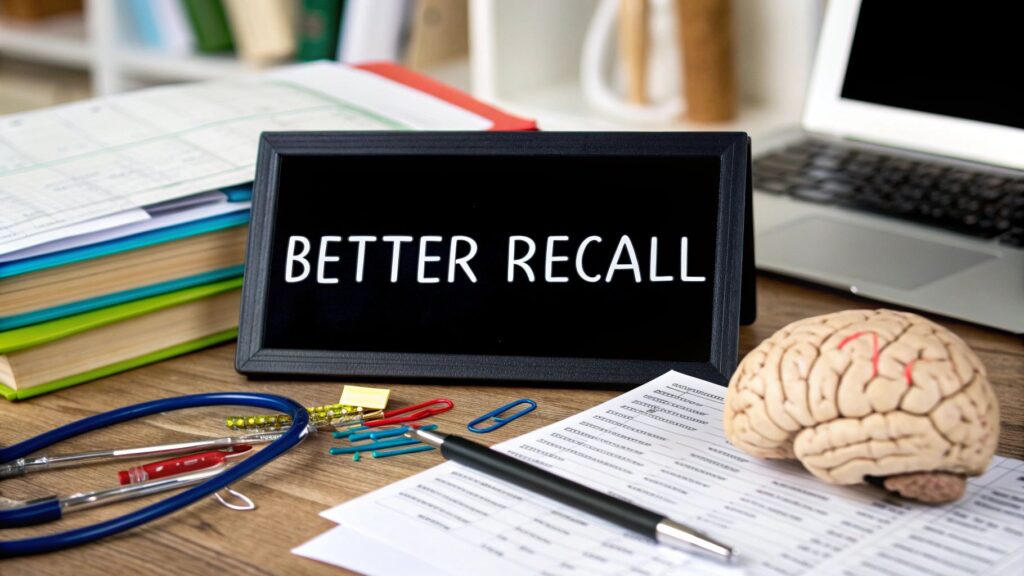To truly master the mountain of information in medical school, you have to fundamentally change how you study. It’s not about logging more hours; it’s about making those hours count. This means moving away from passive re-reading and embracing active, strategic techniques that force your brain to engage, recall, and build durable knowledge.
Why Medical School Feels Like Drinking From a Firehose
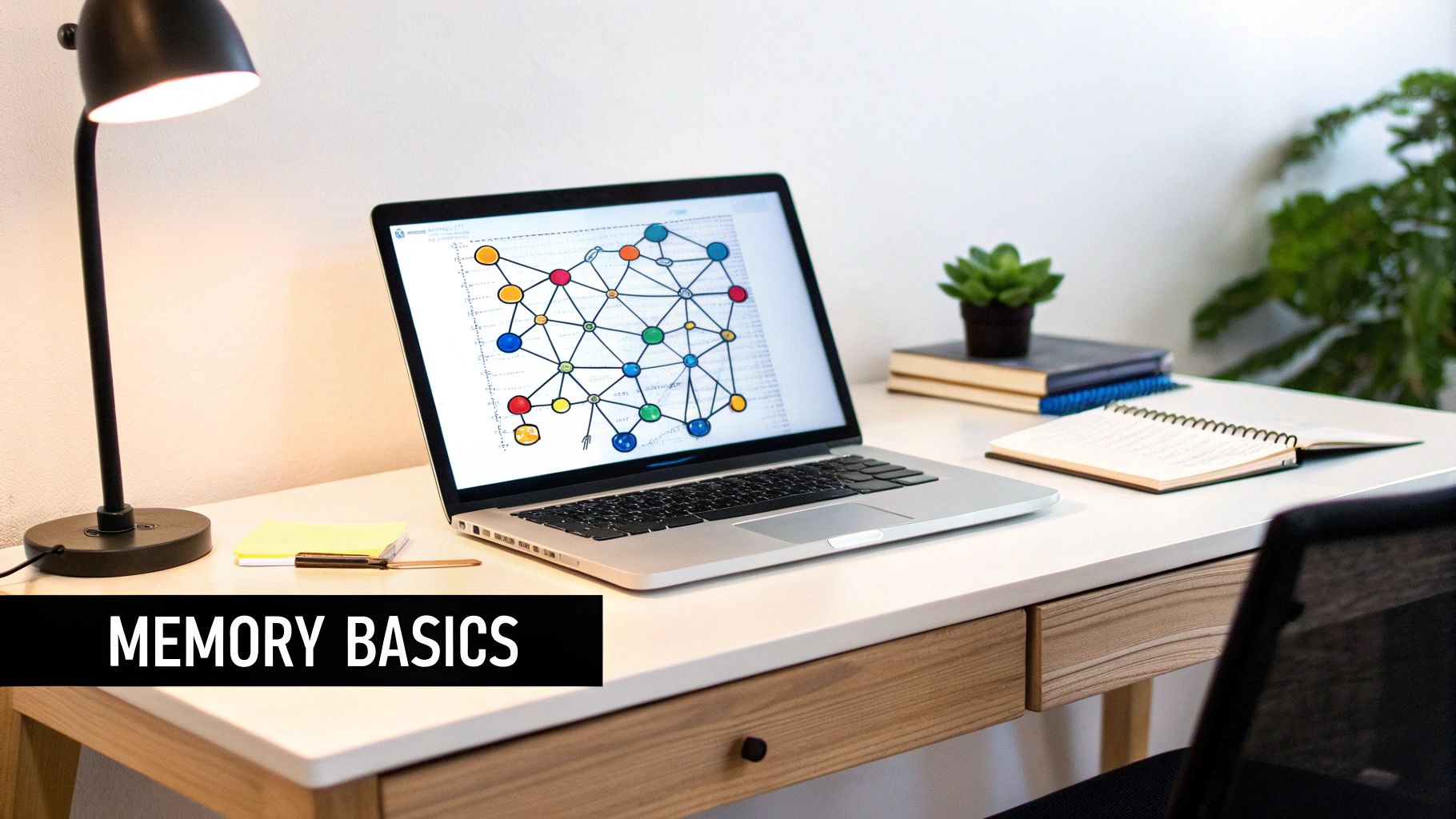
That feeling of being completely swamped by information is a rite of passage for every medical student. You spend an entire day wrestling with complex biochemical pathways and anatomical structures, only to feel it all slipping away by the weekend. If this sounds painfully familiar, you're not failing—you're just experiencing a predictable cognitive quirk.
Your brain is an efficiency machine. It’s hardwired for survival, not for memorizing thousands of isolated facts from a textbook. Any information that isn't actively used or deemed critical gets tagged for deletion. This biological housekeeping is explained by the forgetting curve, a concept that shows just how quickly our memory decays without reinforcement.
The Science of Forgetting
The forgetting curve is a harsh reality check. Research shows a staggering drop in memory almost immediately after you learn something new. The data can be pretty sobering.
Without any review, you can forget roughly 50% of new information within the first hour and up to 70% within 24 hours. By the end of a single week, that number can skyrocket to 90%. You can explore more about these learning retention statistics to see just how fast knowledge fades.
Here's a closer look at just how much you can lose in that critical first day after a lecture if you don't take action.
The Forgetting Curve: Your First 24 Hours After a Lecture
This table illustrates how quickly memory decays without reinforcement, helping you understand the urgency of applying retention techniques.
| Time After Learning | Average Information Forgotten |
|---|---|
| 1 Hour | ~50% |
| 9 Hours | ~60% |
| 24 Hours | ~70% |
This steep decline is precisely why the "I'll just study more" approach is a losing battle. The sheer volume of the medical curriculum is far too great for our brains to handle with passive exposure alone.
The real challenge isn't just learning the information; it's preventing your brain from automatically deleting it. This is where strategic retention techniques become your superpower.
To truly improve your memory, you have to send a strong signal to your brain that a piece of information is important enough to keep. Passive methods, like re-reading notes or highlighting your textbook, create a dangerous illusion of familiarity. Your brain recognizes the material, but it can't actually retrieve it when you need it most.
Shifting to an Active Mindset
The secret to conquering the forgetting curve is simple: shift from being a passive consumer of information to an active participant in your own learning. It’s about intentionally and repeatedly engaging with the material in a way that makes your brain work for it.
Every time you force your brain to retrieve a fact, you strengthen its neural pathway, making it easier to access later. Think of it like building a mental muscle. The struggle is what makes you stronger.
Here’s what that shift looks like in practice:
- Passive Studying: Re-watching a lecture, skimming a chapter, or glancing over highlighted notes. These activities feel productive but do almost nothing for long-term retention.
- Active Studying: Answering practice questions without peeking at the answers, explaining a concept out loud to a friend (or your wall), or creating flashcards that force you to pull facts from memory.
Understanding this difference is the single most important step you can take. It validates the struggle so many of us face and points to a clear solution. By adopting active, evidence-based strategies, you take control of your learning and start building a knowledge base that will stick with you throughout your entire medical career.
Mastering Active Recall and Spaced Repetition
Simply knowing the forgetting curve exists isn't enough—you have to actively fight back. The two most powerful, evidence-based weapons in your arsenal are active recall and spaced repetition. These aren't just study fads; they're cognitive science principles that directly attack your brain's natural impulse to discard information.
The key is moving from passive learning to active engagement. Think about it: active strategies like hands-on practice can rocket retention up to 90%. That’s a massive jump from the measly 10% we retain from just hearing something or 20% from reading. Pair that with strong visuals, and you can boost retention by up to 65%.
Embrace the Power of Active Recall
Active recall, or retrieval practice, is the simple act of pulling information out of your brain instead of just looking at it. Instead of passively re-reading a drug's mechanism of action, you force your brain to find the answer. This struggle is what actually builds and strengthens the neural pathways for that memory.
Here’s an analogy I use with my students: Re-reading your notes is like strolling down a familiar, well-lit path. It’s comfortable and requires almost no effort. Active recall is like being asked to navigate that same path after dark. It’s a struggle at first, but that effort forces you to build a true mental map, making the path unforgettable.
Here’s how you can weave active recall into your study routine today:
- Question Everything: Don't just read a statement like, "Metformin decreases hepatic gluconeogenesis." Turn it into a question: "What is the primary mechanism of action for Metformin?" and answer it without looking.
- The Blank Page Method: After studying the branches of the brachial plexus, put everything away. Grab a blank piece of paper and sketch out everything you can remember. This immediately shows you what you actually know versus what you merely recognize.
- Teach the Concept: Try explaining a complex topic like the renin-angiotensin-aldosterone system out loud. You can explain it to a study partner, a confused family member, or even just your bedroom wall. The act of articulating the information forces you to organize your thoughts and retrieve the facts.
This process is absolutely fundamental for med students. We go into even more detail in our complete guide on active recall for medical students.
Implement Spaced Repetition
Spaced repetition is the perfect partner to active recall. The idea is to review information at increasing time intervals—right as you’re about to forget it. You’re not just mindlessly cramming; you’re being strategic. Each time you successfully recall the information, you push the forgetting curve further and further away, locking that knowledge into your long-term memory.
The goal of spaced repetition isn't just to review; it's to review smart. By timing your reviews, you minimize study time while maximizing long-term retention.
Let's say you just learned the Krebs cycle. The old-school (and highly ineffective) way is to cram it all night and then not touch it again until the test. A spaced repetition schedule looks completely different and is far more effective.
Spaced Repetition Schedule Example: The Krebs Cycle
| Review Session | Time Interval After Initial Learning | Type of Review (Active Recall) |
|---|---|---|
| Review 1 | 1 Day | Attempt to draw the entire cycle from memory. Answer flashcards on key enzymes. |
| Review 2 | 3 Days | Explain the regulatory steps of the cycle out loud. Answer practice questions. |
| Review 3 | 1 Week | Quickly sketch the main components and their connections to other pathways. |
| Review 4 | 2-3 Weeks | Work through clinical vignettes involving Krebs cycle defects. |
And don't forget the foundation for all of this. These high-level cognitive techniques only work if you're taking care of the basics.
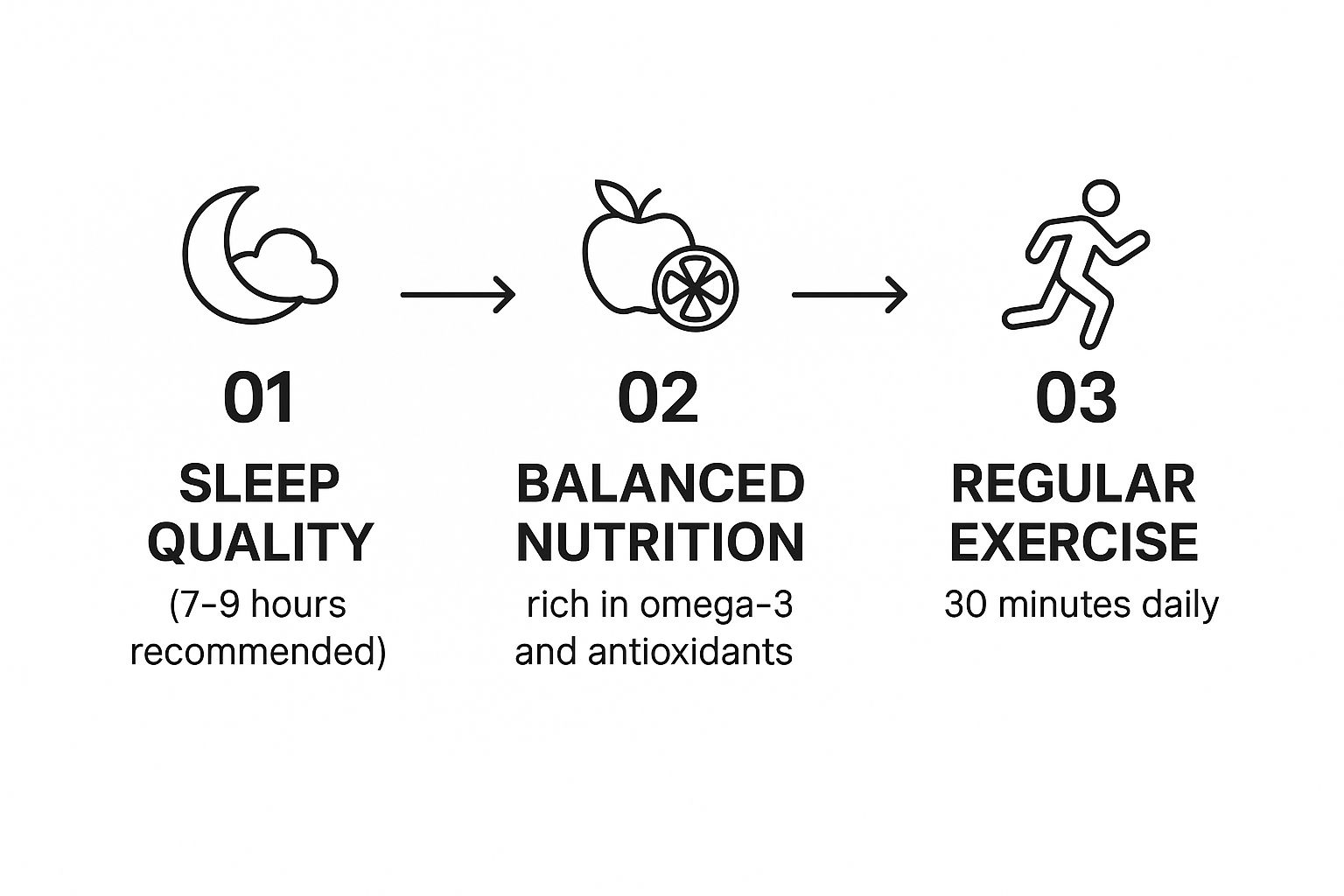
As this infographic shows, quality sleep, good nutrition, and regular exercise are the bedrock of cognitive function. They directly fuel your brain's ability to learn and hold onto complex medical information.
Find the Right Tools for the Job
You don't need fancy, expensive software to get started, though it can certainly help. The best system is simply the one you'll stick with consistently.
- Paper Flashcards: The classic for a reason. The act of creating them by hand is a form of active learning. They’re portable, cheap, and free from digital distractions. The downside? You have to manage the spacing intervals yourself, which can get complicated fast.
- Digital Flashcard Apps (like Anki): Apps like Anki were built from the ground up for spaced repetition. Its algorithm automatically schedules your reviews, making the process incredibly efficient for the sheer volume of med school. Be warned: it has a notoriously steep learning curve, but the payoff is huge.
- Spreadsheet Method: A simple spreadsheet can work wonders for tracking topics and review dates. It’s more manual than Anki but also more flexible and much easier to set up if you're not tech-savvy.
By combining active recall with a spaced repetition schedule, you stop being a passive victim of the forgetting curve. You start studying strategically, building the durable knowledge you need not just to pass your exams, but to excel in your future clinical practice.
Building a Web of Knowledge with Interleaving and Elaboration
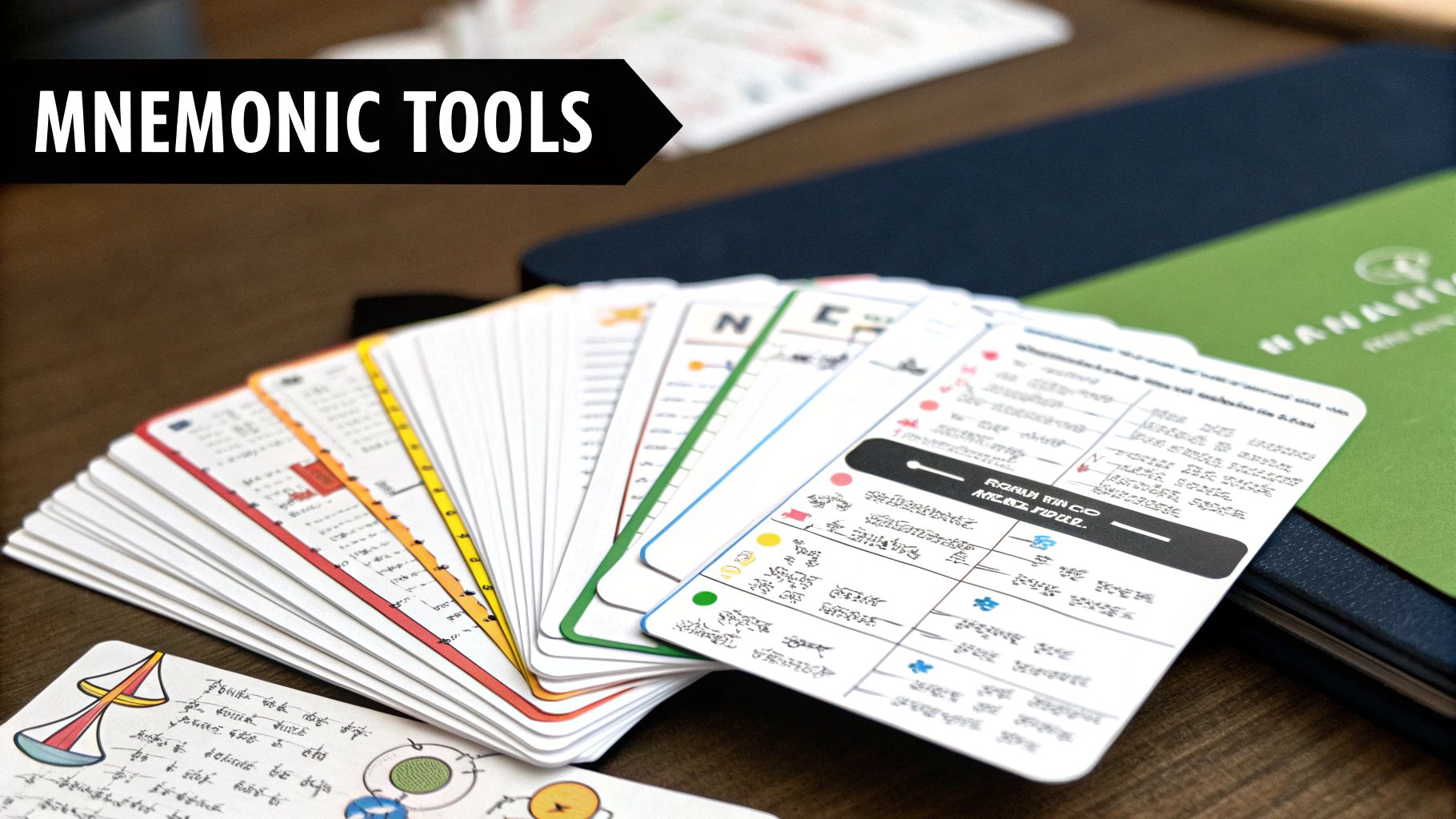
Trying to memorize isolated facts is a recipe for disaster. It’s like building a house of cards—it might look impressive for a moment, but it collapses the second you’re under pressure in an exam. A much smarter approach is to build a strong, interconnected web of knowledge.
To do this, you need to ditch the brute-force memorization and embrace two powerful techniques: interleaving and elaboration. These strategies force your brain to create deeper, more meaningful connections, building a mental framework that’s durable enough for both your exams and your future clinical practice. This is about building knowledge you can actually use, not just recite.
Mix It Up with Interleaving
Interleaving is simply the practice of mixing multiple related subjects into a single study session. It’s the polar opposite of "blocking," where you might grind away at one topic for hours before finally moving on. While blocking might feel more productive, the research is clear: interleaving creates far more lasting learning.
So why does it work? When you constantly switch between related topics, you’re forcing your brain to load and reload different mental models. That "struggle" makes your brain work harder to spot the subtle differences and similarities between concepts. It’s this effort that leads to a much deeper level of understanding.
Think about a typical med student studying pharmacology. The common approach is to block-study, maybe spending an entire day just on cardiovascular drugs. An interleaved approach is way more effective.
Example of an Interleaved Study Session
Instead of just hammering away at cardio drugs, you could structure your time like this:
- 45 minutes: Study beta-blockers and ACE inhibitors (Cardiovascular).
- 45 minutes: Switch to diuretics and their effect on the nephron (Renal).
- 45 minutes: Move on to bronchodilators and inhaled corticosteroids (Respiratory).
- 45 minutes: Circle back to review antiarrhythmic drugs (Cardiovascular).
This method forces you to truly differentiate between the mechanisms of a beta-blocker and a diuretic—something that’s impossible when you’re only looking at one system. You're building flexible problem-solving skills that mirror the reality of clinical diagnosis, where patients rarely present with a neat, single-system problem.
By forcing your brain to switch gears, interleaving makes your knowledge more adaptable. You’re not just memorizing facts; you’re learning to select the right tool from your mental toolbox for a specific problem.
Create Deeper Meaning with Elaboration
While interleaving helps you tell concepts apart, elaboration is the art of connecting them. It’s the process of taking new information and actively linking it to what you already know. This creates a rich network of associations, anchoring new memories to your existing long-term knowledge base.
Put simply, you start asking "why" and "how" new information fits into the bigger picture. This transforms you from a passive sponge for facts into an active creator of knowledge. The more connections you build to a memory, the more paths your brain has to find it later.
Here are a few practical ways to use elaboration:
- Ask "Why" Repeatedly: When you learn about a new drug, don't just memorize its side effects. Ask why it causes those side effects. For instance, if a medication causes hyperkalemia, trace its mechanism all the way back to the physiology of the renin-angiotensin-aldosterone system you learned last year. Suddenly, pharmacology is connected to physiology.
- Explain It to a 5-Year-Old (The Feynman Technique): Try to explain a complex topic, like the coagulation cascade, in the simplest terms you can. This forces you to distill it down to its core principles, and it quickly reveals any gaps in your own understanding.
- Create Analogies: Compare the function of the lymph nodes to a series of security checkpoints in a building. Or think of ATP as the "currency" of the cell. These mental shortcuts make abstract concepts more concrete and far easier to remember.
Combining Interleaving and Elaboration
These two techniques are a powerhouse when you use them together. Interleaving gives you the varied material, and elaboration gives you the tools to connect the dots.
Here’s what that looks like in practice for a med student:
| Technique | Ineffective "Blocking" Method | Effective Interleaved & Elaborated Method |
|---|---|---|
| Topic | Studying all of microbiology | Mixing bacteriology, virology, and immunology |
| Method | Reading a chapter on Staphylococcus aureus | Studying S. aureus, then switching to the T-cell response to bacterial infections (elaboration), then studying herpesviruses (interleaving). |
| Goal | Memorize the features of one bug | Understand how different pathogens interact with different parts of the immune system. |
This combined approach feels tougher and slower at first, but that’s how you know it's working. You're building a robust web of knowledge, not a fragile chain of facts. This is the key to creating the deep, flexible understanding of medicine that will serve you throughout your entire career.
Using Sleep as a Strategic Learning Tool
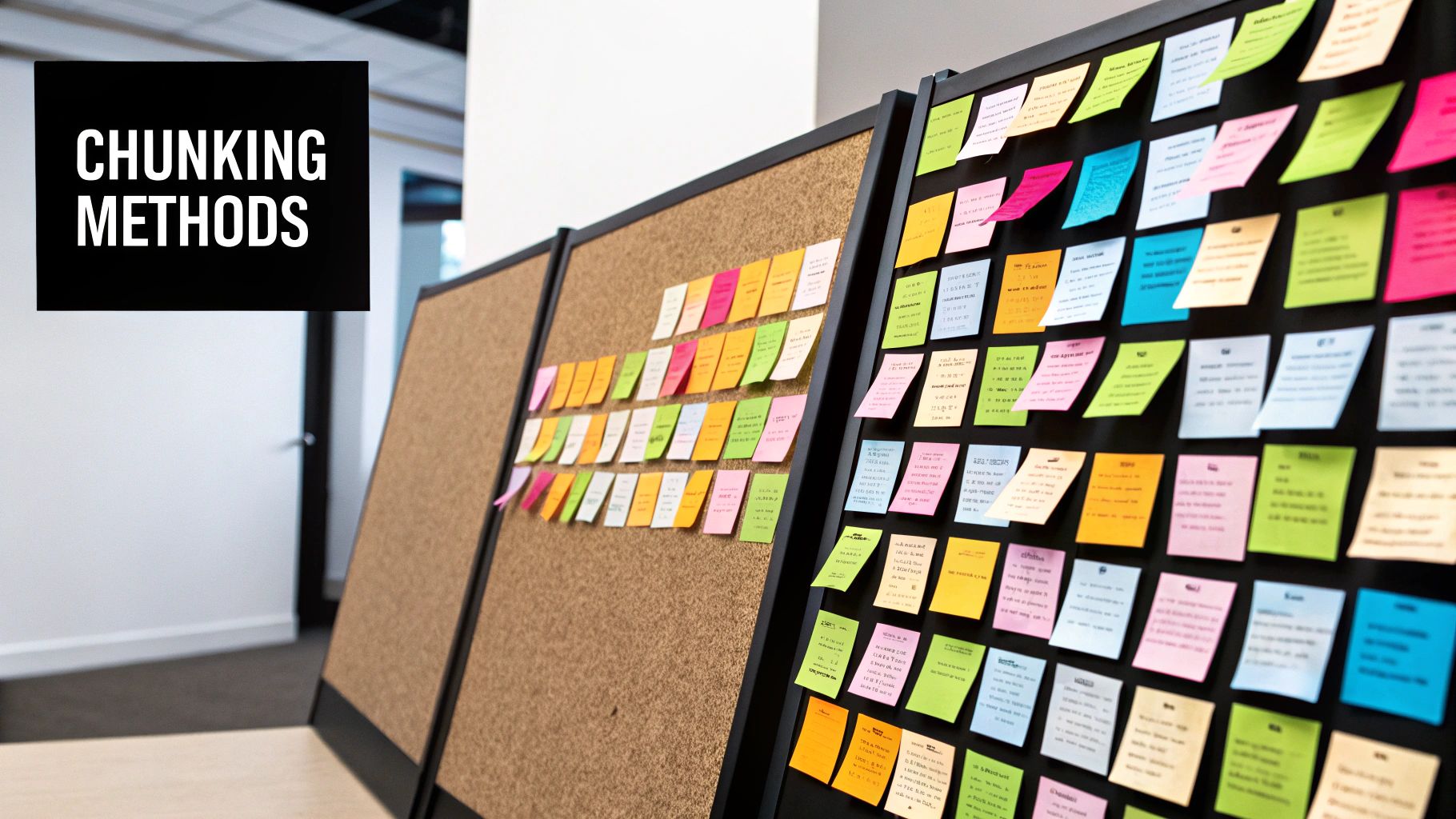
For medical students, sleep often feels like a luxury. It’s that thing you have to do that cuts into precious study time. But viewing sleep as an obstacle is one of the biggest mistakes you can make for your learning. It's not downtime. It’s an active, critical phase of memory consolidation where your brain is working hard to process, organize, and lock in everything you studied that day.
Think of it this way: your brain is a librarian at the end of an insanely busy day. All day, new books (memories) have been piling up on the front desk. Sleep is the overnight shift. The librarian meticulously sorts through each book, decides which ones are important enough to keep, and files them away on the correct shelves in the long-term memory stacks. Without that overnight crew, the desk just becomes a chaotic mess, and crucial information gets lost.
This process isn’t just a nice metaphor; it’s a highly structured biological function that directly impacts how well you retain information.
The Architecture of Memory-Boosting Sleep
To really appreciate sleep, you need to understand its architecture. Different stages of sleep handle different memory functions, and getting a full night's rest is non-negotiable for mastering the complex material of medical school.
First, you hit slow-wave sleep (SWS), or deep sleep. This stage is absolutely essential for consolidating declarative memories—the "what" of your studies, like facts, figures, and drug names. During SWS, your brain is busy replaying the neural patterns of things you learned while awake, strengthening those connections and moving them into more permanent storage. This is where you solidify your understanding of a drug's side effects or the steps of a metabolic pathway.
Then there's Rapid Eye Movement (REM) sleep. This is the stage famous for dreaming, but it’s also vital for procedural memory—the "how" of what you're learning. This covers skills like interpreting an EKG, performing a physical exam maneuver, or even connecting disparate ideas to solve a complex clinical problem.
Missing out on either of these stages creates a huge learning deficit. Skimping on deep sleep means you lose the raw facts. Cutting REM sleep short prevents you from seeing the bigger picture and how all those facts connect.
Advanced Sleep Science for Enhanced Recall
The science around sleep and memory is always uncovering fascinating ways to make our rest even more productive. One of the most exciting fields is Targeted Memory Reactivation (TMR), a technique where subtle memory cues are presented during sleep to supercharge recall.
For example, if you study a specific topic while smelling a unique scent (like rosemary), being re-exposed to that same scent during slow-wave sleep can selectively boost your memory of that exact material. It might sound like science fiction, but the research is solid. Studies on Targeted Memory Reactivation (TMR) have shown major improvements in memory retention. One study even found that TMR led to a 27% improvement in memory for patients with amnestic Mild Cognitive Impairment. You can dig into the memory reactivation findings yourself to see the data.
Practical Sleep Hygiene for the Overwhelmed Student
Knowing sleep is important is one thing. Actually getting enough of it on a med school schedule is another beast entirely. Here’s some realistic, actionable advice to make sleep your strategic partner, not your enemy.
- Create a "Wind-Down" Buffer Zone: You can't go from frantically reviewing flashcards to deep sleep in five minutes. Your brain needs a transition. Dedicate the last 30-60 minutes before bed to non-academic, relaxing activities. Read a novel, listen to some calming music, or do some light stretching. This signals to your brain that it's time to switch off study mode.
- Manage Your Light Exposure: Your brain’s sleep-wake cycle is almost entirely run by light. Try to get some sunlight in the morning to promote wakefulness. In the evening, dim the lights in your study area and use blue-light-filtering apps on your devices. Most importantly, do not look at your phone in bed. That bright screen is telling your brain it's time to be wide awake.
- Be Smart About Napping: A short nap of 20-30 minutes can be a game-changer for alertness and performance. If you have more time, a longer nap of around 90 minutes allows you to complete a full sleep cycle, which can really help with memory consolidation. Just try to avoid long naps late in the afternoon, as they can mess with your nighttime sleep.
- Maintain Consistency: This is the hard one, but it pays off. Try to go to bed and wake up around the same time every day, even on weekends. This reinforces your body's natural circadian rhythm, making it much easier to fall asleep and wake up feeling refreshed.
By reframing sleep from a necessary evil to your most powerful, passive study tool, you can dramatically improve your ability to learn and retain the massive amount of information you need to succeed in medicine.
How Lifestyle Choices Impact Your Cognitive Performance
All the high-level study techniques we’ve covered are game-changers, but they're only half the battle. Your brain doesn't operate in a vacuum. Its raw ability to encode and retrieve information is directly tied to your physical and mental well-being.
Think of it this way: your brain is a high-performance computer. The most advanced study software in the world won’t run well on malfunctioning hardware. Optimizing your lifestyle is how you upgrade that hardware, creating the ideal biological environment for learning to happen. This isn’t about piling more tasks onto your already packed schedule, but making strategic choices that pay huge dividends for memory retention.
Fuel Your Brain with Smart Nutrition
What you eat has a profound and immediate impact on your cognitive function. While a balanced diet is always the goal, certain nutrients are absolute superstars when it comes to brain health and memory. This is your nutritional toolkit for a sharper mind.
You can take a deep dive into the role of nutrition in brain health and memory for a more detailed guide, but for busy med students, focusing on a few key food groups can provide a significant cognitive edge.
- Omega-3 Fatty Acids: Found in fatty fish like salmon and in walnuts, these are the literal building blocks for your brain cells. They help build and repair neurons, a process essential for forging new memories.
- Antioxidants: Foods packed with antioxidants—like berries, dark chocolate, and leafy greens—help combat oxidative stress in the brain. This protects your neurons from damage, keeping your memory pathways clear and efficient.
- Complex Carbohydrates: Oats, quinoa, and whole grains provide a steady supply of glucose, which is your brain's primary fuel. Unlike the sharp spike and crash from sugary snacks, these offer sustained energy for those long study sessions.
Move Your Body to Build Your Mind
Physical exercise is one of the most powerful—and often overlooked—tools you have for boosting brain function. It’s not just about general health. Specific types of exercise directly promote neurogenesis, the creation of new neurons, particularly in the hippocampus—the brain region critical for learning and memory.
You don't need to live in the gym to see the benefits. Even 20-30 minutes of moderate aerobic exercise, like a brisk walk or jog, can significantly improve memory and concentration for hours afterward. This activity boosts blood flow to the brain, delivering a fresh supply of oxygen and nutrients right where they're needed most.
Remember: Exercise isn't a distraction from your studies; it's an essential part of the learning process itself. A short, active break can be far more productive for memory consolidation than another hour of passively re-reading your notes.
Manage Stress to Protect Your Memory
Chronic stress is a memory killer. Plain and simple. When you're constantly stressed, your body is flooded with the hormone cortisol. While useful in short bursts for fight-or-flight situations, persistently high cortisol levels can damage and even destroy neurons in the hippocampus. This directly cripples your ability to form new long-term memories.
For a medical student, stress is unavoidable. But managing it is a skill you can learn. Integrating simple mindfulness techniques into your day can make a massive difference.
- Mindful Breathing: Take just two minutes between study blocks. Close your eyes and focus only on your breath—the sensation of the air entering and leaving your body. This simple act can lower cortisol and hit the reset button on your nervous system.
- The 5-4-3-2-1 Grounding Technique: When you feel overwhelmed and your thoughts are spiraling, ground yourself in the present. Name five things you can see, four things you can feel, three things you can hear, two things you can smell, and one thing you can taste. It pulls you out of the stress spiral and back into the moment.
To help you put these ideas into practice, here is a quick summary of actionable lifestyle changes you can start making today.
Actionable Lifestyle Changes for Better Memory
| Lifestyle Factor | Actionable Tip | Cognitive Benefit |
|---|---|---|
| Nutrition | Incorporate a serving of fatty fish (like salmon) or walnuts into your meals twice a week. | Provides essential omega-3s, which are building blocks for neuron repair and memory formation. |
| Exercise | Schedule a brisk 20-minute walk or jog before a major study session. | Increases blood flow to the brain and promotes neurogenesis in the hippocampus. |
| Stress Management | Practice the 5-4-3-2-1 grounding technique when you feel overwhelmed during studying. | Lowers cortisol levels, protecting the hippocampus from stress-induced damage. |
| Sleep | Establish a consistent "wind-down" routine 30 minutes before bed, with no screens. | Critical for memory consolidation, where the brain converts short-term memories into long-term storage. |
By actively managing your nutrition, exercise, and stress, you're not just supporting your health—you're creating the optimal foundation for all the other study techniques to work. These aren't just "nice-to-haves"; they are powerful variables that can dictate your academic success.
If you're looking for more ways to sharpen your study habits, be sure to check out our other powerful memorization techniques for medical school.
Got Questions About These Memory Techniques?
Whenever you start weaving new study habits into your routine, practical questions are bound to pop up. It's completely normal. As you get your hands dirty with active recall, spaced repetition, and interleaving, you'll naturally start wondering about timelines, how to apply them to specific situations, and where to even begin.
Let's walk through some of the most common concerns I hear from medical students when they decide it's time to start studying smarter, not just harder. Getting these details ironed out is key to setting realistic expectations and tailoring these powerful principles to your unique situation.
How Quickly Will I Actually See Results?
This is the big one, and the answer is both right away and over time. You will absolutely feel the "good kind of struggle" of active recall from day one. That slight mental friction is the very first sign that it's working—you're forcing your brain to build stronger, more durable memories.
But the tangible payoff—that feeling of confidence and quick recall during an actual exam—takes a bit longer to build. Here’s a realistic timeline based on what most students experience:
- Short-Term (1-2 weeks): You'll probably start noticing that the facts you're reviewing with spaced repetition are "stickier" than before. Information from your daily studies just seems to hang around better.
- Medium-Term (1-2 months): This is where the magic really starts. After using these techniques consistently, you'll walk into an exam feeling genuinely prepared. You’ll spend less time desperately trying to dredge up a forgotten detail and more time actually applying what you know.
- Long-Term (6+ months): The knowledge becomes almost second nature. Concepts you learned months ago are still there when you need them, and the web of interconnected information you’ve built makes learning new, related topics feel surprisingly easy.
How Do I Use This Stuff for Practical Exams like OSCEs?
Great question. While flashcards are a go-to for factual recall, these techniques are incredibly powerful for practical skills, too. The trick is to apply the same core principles—active retrieval and spaced practice—to physical actions and clinical reasoning, not just words on a page.
You have to shift from just memorizing facts to practicing doing.
Here’s how you can adapt the techniques for a hands-on exam like an OSCE:
| Technique | Written Exam Application | OSCE Application |
|---|---|---|
| Active Recall | "What are the side effects of Metformin?" | "Talk me through the steps of a complete abdominal exam, out loud, without looking at a checklist." |
| Interleaving | Mixing cardiology and renal pharmacology. | Practicing a focused cardiac exam, then a neurological exam, then a respiratory exam in one session. |
| Elaboration | "Why does this drug cause this side effect?" | "Why am I auscultating at this specific point on the chest? What pathology would I hear here?" |
This approach takes you beyond rote memorization and straight into the world of true clinical competence. If you need more structure, digging into comprehensive medical exam study tips can give you a solid framework for both your written and practical assessments.
I'm Overwhelmed. If I Can Only Do One Thing, What Should It Be?
If you feel like you're drowning and only have the bandwidth to make one single change, make it active recall. No question.
Active recall is the engine of memory formation. Spaced repetition is just the schedule that makes the engine run efficiently. But without the engine, you're not going anywhere.
Start small to make it stick. At the end of each study block, just put everything away—notes, books, laptop—and spend five minutes writing down everything you can remember on a blank sheet of paper. This simple act forces your brain to retrieve information, which is the most critical part of learning. Once that feels like a natural habit, then you can start layering in a more formal spaced repetition schedule.
Is It Too Late for Me to Start Using These Methods?
Absolutely not. It truly doesn't matter if you're a first-year student staring down the barrel of anatomy or a fourth-year prepping for your final board exams. The principles of how our brains learn don't change.
Starting today is infinitely better than never starting at all. A final-year student who adopts these techniques for board prep will still see massive benefits and, more importantly, will build study habits that will serve them for their entire career in medicine. Your brain is plastic; it's designed to learn new, more effective ways of doing things. The best time to start was yesterday. The second-best time is right now.
At Ace Med Boards, we specialize in turning these evidence-based techniques into a personalized study plan that fits your needs. Our expert tutors can help you implement active recall, spaced repetition, and other powerful strategies to conquer your exams. Book a free consultation today to see how we can help you study smarter and achieve the scores you deserve.

